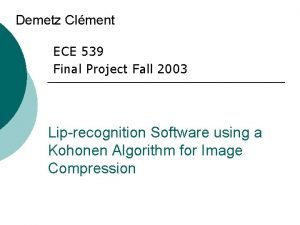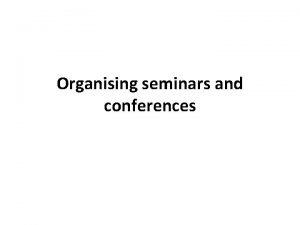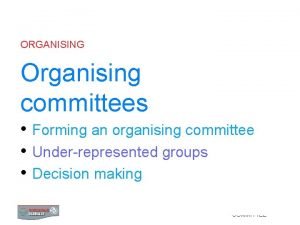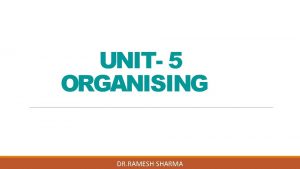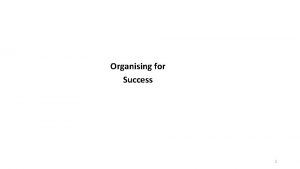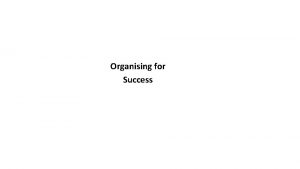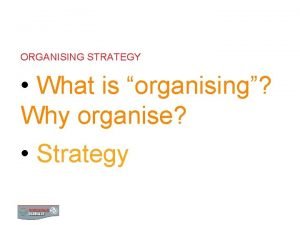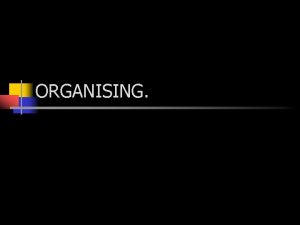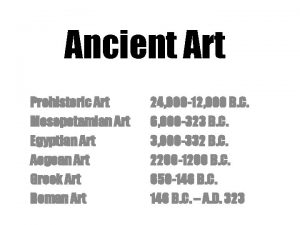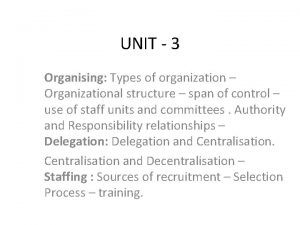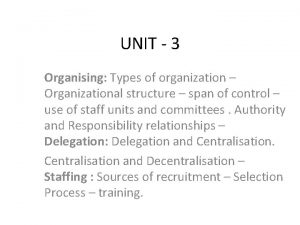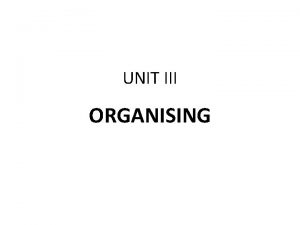Unit 1 ORGANISING INTRODUCTION Management is the art
























- Slides: 24

Unit -1 ORGANISING

INTRODUCTION • Management is the art of getting things done through others and with people formally organized in groups. It is also defined as the art and science of decision making. It is the creation and maintenance of an internal environment in an enterprise where individuals working in groups, can perform efficiently and effectively towards the attainment group goals.

DEFINITION • According to Mary Parker Follett” Management is the art of getting things done through others “. • Harold Koontz defined management as ” Management is the art of getting things done through and with people informally organized in groups”.

CHARACTERISTICS 1. 2. 3. 4. 5. 6. 7. 8. 9. 10. Multidisciplinary Management is a group activity. Management is a goal – oriented Management is a factor of production Management is universal in character Management is a social process Management is a system of authority Management is a dynamic function Management is an art as well as a science Management is a profession

SCOPE OF MANAGEMENT 1. Production management: production means conversion of raw materials into finished products. It involves plant location and layout, production policy, type of production, plant facilities, material handling, production planning and control etc. 2. Marketing Management: marketing is a sum total of physical activities which are involved in the transfer of goods and services and which provide for their physical distribution. It involves market analysis, marketing policy, brand name, pricing, channels of distribution, sales promotion, sales – mix, after sales service, market research etc. 3. Financial management: financial management is concerned with the managerial activities pertaining to the procurement and utilization of funds or finance for business purposes. The functions of financial management includes: 1. Estimation of capital requirements 2. Ensuring a fair return to investors 3. Determining the suitable sources of funds 4. Laying down the optimum and suitable capital structure for the enterprise. 5. Co-ordinating the operations of various departments 6. Preparing, analyzing and interpretation of financial statements 7. Laying down a proper dividend policy, and 8. Negotiating outside finance

4. Personnel management: personnel management involves effective control and use of manpower. personnel management is concerned with managerial and operative functions. Managerial functions of personnel management include: 1. Personnel planning 2. Organizing by setting up the structure of relationship among jobs, personnel and physical factors to contribute towards organization goals 3. Directing the employees 4. Controlling 5. The operative functions of personnel management are: 1. Procurement of right kind and number of persons 2. Training and development of employees 3. Determining of adequate and equitable compensation 4. Integration of the interests of the personnel with that of enterprise; and 5. Providing good working conditions and welfare services to the employees. 6. Office management: The concept of management when applied to office is called ‘office management’. Office management is the technique of planning, co-ordinating and controlling office activities. One of the functions of management is to organise the office work in such a way that it helps in achieving organizational goals.

14 Principles of Management/ Henry Fayols Principles of Management • • Division of work: Division of work implies division of the total task in order to reduce the burden and to promote specialization so that one person does only one thing rather than doing everything himself. This helps to avoid wastage of time and effort from one work to another. Fayol has suggested that this principle of division of work shall be applied to all kinds of work – technical as well as managerial. Parity of authority and responsibility: This principle states that authority and responsibility should go side by side. A person can be accountable only if he has been given authority for getting the work done. Responsibility and authority should be commensurate with each other. Authority without responsibility leads to irresponsible behavior and responsibility without authority makes a person ineffective. Discipline: Discipline means obedience, respect of authority and observance of the established rules. Discipline is essential for the smooth functioning of business. According to Fayol good supervision at all levels, clarity of rules and built in system of reward and punishment help to maintain discipline. .

• Unity of command: this principle states that one person should receive orders from only one superior. If one person receives orders from more than one boss then the subordinate fails to understand whose orders to be followed. • Unity of direction: the principle states that each group of activities having the same objectives must have one plan of action and must be under the control of one superior. • Subrogation of individual interest to general interest: it is an essential function of management to make people realize the objectives of the group and direct their efforts towards the achievement of these objectives. The interest of group must always prevail over individual interest. When the individual interest and group interest differ, it is the duty of the management to reconcile them

• Fair remuneration to workers: Fayol was of the view that the remuneration paid to the workers should always be fair and should give maximum satisfaction to the employees and employer. • Effective centralization: centralization means concentration of authority in the hands of few, i. e. top management. Everything which goes to increase the importance of subordinate’s role is called decentralization and everything that goes to reduce the importance of subordinate is called centralization. The degree of centralization may be different in different cases, but a balance should be maintained between centralization and decentralization of authority to attain the best possible results. • Scalar chain: Scalar chain is the formal line of authority which moves from highest to lowest rank in a straight line. This chain specifies the route through which the information is to be communicated to the desired location/person. Fayol emphasized that every information in the organization must flow according to this chain This chain must be strictly followed in the organization. Fayol also stated that there should be no overlapping of steps during the communication process

• Fayol introduced the concept of ‘Gang Plank’. The scalar chain in an organization is represented by the double ladder GAQ. Any communication from F to P will flow upward A throw E, D, C, and B; and then downwards through L, M, N, and O. it will take a long time. Hence in order to reduce the delay involved in communication, a gang plank between F and P may be created as shown by a dotted line. However this should not be used under normal course of time.

• Order: the principle of order implies that right man in right job and right material in the right place. • Equity: equity means justice and kindliness. Fayol was of the opinion that there should neither be nepotism nor favouritism and all should be given just and treatment. • Stability of tenure of personnel: stability of tenure of a personnel is very essential because it takes time to used to a job. Fayol was of view that instability of tenure of personnel is both the cause and effect of bad management. Instability of tenure increases cost of selection and training and brings bad name to the organization. To secure loyalty of workers, it is very essential to provide security of service to the workmen. • Initiative: initiative implies the power of thinking out a plan and ensuring its successful implementation. The manager should encourage or inspire the confidence of his subordinates so that they show initiative. • Espirit –de-corps: this principle implies that there should be co-operation and team work among the members of an organization. Literally speaking, Espirit-decorps means the spirit of loyalty and devotion to the group to which one belongs.

LEVELS OF MANAGEMENT 1. Top level management: - It includes board of directors, chief executive or general managers , senior strategist, decision making, directors. Corporate level goals, missions and objectives are determined. 2. Middle level management: - It includes departmental managers, divisional heads and section officers. It acts as a bridge between top level management and lower level management. 3. Lower level management: - It includes supervisors, foremen and workers. it is also known as supervisory level of management in which the supervisors or foreman like sales officers , account officers etc take responsibilities of the implementation and control of the operational plans developed by the middle level managers.

DIFFERENCES BETWEEN LEADER AND MANAGER

DIFFERENCES BETWEEN ADMINISTRATION AND MANAGEMENT

SCIENTIFIC MANAGEMENT • MEANING : Scientific management implies the application of science to the job management of an industrial concern. It aims at replacement of traditional techniques by scientific techniques. Scientific management is a thoughtful, organized human approach to the job of management as contrasted with hit or miss, rule of thumb. “It is the art of knowing exactly what you want men to do and then seeing that they do it in the best and cheapest way. ”

DEFINITION: “Scientific management is the substitution of exact scientific investigations and knowledge for the old individual judgment or opinion in all matters relating to the work done in the shop”. —F. W. Taylor

TECHNIQUES OF PRINCIPLES OF MANAGEMENT

Planning: the four functional foremen under planning function are: – Route clerk: concerned with laying down sequence of operations and direct the workers to follow them. – Instruction card clerk: lays down the exact method of doing a work, use of tools and equipments, and the optimum speed at which machines are to be worked, etc. – Time and cost clerk: concerned with maintaining records of time spent by different workers on different jobs and associated rates. – Shop disciplinarian: deals with breach of discipline and absenteeism.

Production: 1. The four functional foremen under production function are: – Gang boss: assembles and set up various equipments and tools to enable the workers begin their work immediately after entering the shop. – Speed boss: ensures that machines are run at their optimum desired speed. – Repair boss: ensures regular cleaning, servicing, and repair of machines to keep them in efficient working order. – Inspector: ensures that the workmen do the work of the requisite quality and the jobs are executed as per specifications. 2. Standardization and simplification: simplification is the process of determining a limited number of types, sizes, varieties and grades of articles of production with the object of better control and elimination of waste resulting in ultimate economy and ease in manufacture’. Under the scientific management a worker is expected to achieve a standard task/output given to him. For achieving the standard output, standardization of materials, tools and equipment, method of work, speed and conditions of work etc. , should be provided. 3. Time study: time study may be defined as the art of observing time required to do a particular job. It relates to the fixing of time for doing a job under given conditions. 4. Fatigue study: workers are prone to fatigue on account of over work, stress and strain, etc. A fair standard task can be fixed only when it is set after providing for measures to eliminate or minimize fatigue of all kinds, viz. . , physical, psychological, mental and nervous fatigue.

5. Method study: motion study aims at simplifying the production process by reducing the number of operations. On the basis of such a study ‘ a process chart’ setting out the various operations is prepared. 6. Motion study: it involves the study of movement of operations of a worker. It aims to eliminate unnecessary movements so as to perform the work in the best possible manner. 7. piece wage Rate system: Taylor suggested ‘differential piece – wage system’. Under this system, standard hourly or daily output of a worker is fixed and there are two piece rates. Workers performing the standard output are paid a much higher rate per unit than those who are inefficient and are not able to achieve the standard output. Workers who achieve more than the standard output may be given some extra incentives. This system of wage payment is very helpful in increasing the efficiency of workers. 8. Mental revolution – New mental attitude: The techniques of scientific management cannot be applied unless there is complete harmony and co-operation between the workers and management. This calls for a total revolution in the outlook and attitude of both the management and the workers.

Principles of management • • • (1) Science, Not Rule of Thumb: This principle says that we should not get stuck in a set routine with the old techniques of doing work, rather we should be constantly experimenting to develop new techniques which make the work much simpler, easier and quicker. (2) Harmony, Not Discord: As per this principle, such an atmosphere should be created in the organisation that labour (the major factor of production) and management consider each other indispensable. Taylor has referred to such a situation as a ‘Mental Revolution’. Taylor firmly believed that the occurrence of a mental revolution would end all conflicts between the two parties and would be beneficial to both of them. (3) Cooperation, Not Individualism: According to this principle, all the activities done by different people must be carried on with a spirit of mutual cooperation. Taylor has suggested that the manager and the workers should jointly determine standards. This increases involvement and thus, in turn, increases responsibility. In this way we can expect miraculous results. (4) Development of workers: According to this principle, the efficiency of each and every person should be taken care of right from his selection. A proper arrangement of everybody’s training should be made. It should also be taken care that each individual should be allotted work according to his ability and interest. Such a caring attitude would create a sense of enthusiasm among the employees and a feeling of belongingness too.

CRITICISM OF PRINCIPLES OF MANAGEMENT 1. Criticism by Workers: – – – – ‘Speeding Up’ of Workers Loss of workers skill and Initiative Monotony Unemployment Exploitation of Workers Discrimination between workers Undemocratic In Nature Weaker Trade Unions

2. Criticism by Employers: – – – Expensive: Reorganization. Not Suitable For Small Concerns Over-Production Difficulties in Getting Trained Personnel 3. Criticism by Psychologists: – Mechanical in Nature – Speeding Up of Workers – Creation of Monotony – Absence of Non-Wage Incentives – Developing ‘One Best Way’ of Work:

THANK YOU
 What is a project schedule
What is a project schedule Difference between accountability and responsibility
Difference between accountability and responsibility Organising principles
Organising principles Planning organising staffing directing controlling
Planning organising staffing directing controlling Self organising map
Self organising map Staffing and controlling
Staffing and controlling Organizing seminars and conferences
Organizing seminars and conferences Planning and organizing in the workplace
Planning and organizing in the workplace Unit 10, unit 10 review tests, unit 10 general test
Unit 10, unit 10 review tests, unit 10 general test Hình ảnh bộ gõ cơ thể búng tay
Hình ảnh bộ gõ cơ thể búng tay Frameset trong html5
Frameset trong html5 Bổ thể
Bổ thể Tỉ lệ cơ thể trẻ em
Tỉ lệ cơ thể trẻ em Gấu đi như thế nào
Gấu đi như thế nào Tư thế worm breton
Tư thế worm breton Chúa yêu trần thế alleluia
Chúa yêu trần thế alleluia Môn thể thao bắt đầu bằng chữ đua
Môn thể thao bắt đầu bằng chữ đua Thế nào là hệ số cao nhất
Thế nào là hệ số cao nhất Các châu lục và đại dương trên thế giới
Các châu lục và đại dương trên thế giới Công thức tính thế năng
Công thức tính thế năng Trời xanh đây là của chúng ta thể thơ
Trời xanh đây là của chúng ta thể thơ Mật thư tọa độ 5x5
Mật thư tọa độ 5x5 101012 bằng
101012 bằng Phản ứng thế ankan
Phản ứng thế ankan Các châu lục và đại dương trên thế giới
Các châu lục và đại dương trên thế giới




